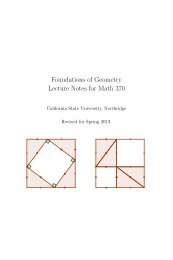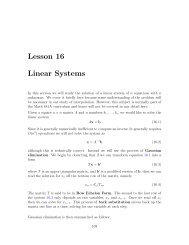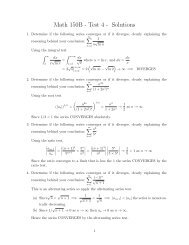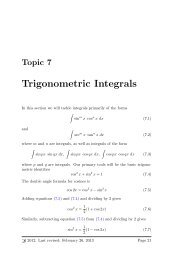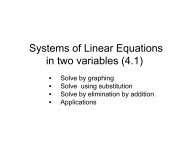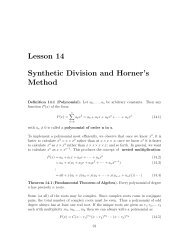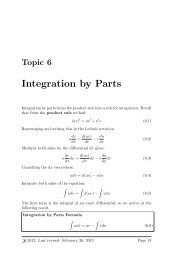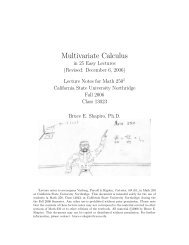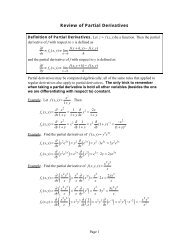The Computable Differential Equation Lecture ... - Bruce E. Shapiro
The Computable Differential Equation Lecture ... - Bruce E. Shapiro
The Computable Differential Equation Lecture ... - Bruce E. Shapiro
You also want an ePaper? Increase the reach of your titles
YUMPU automatically turns print PDFs into web optimized ePapers that Google loves.
CHAPTER 3. APPROXIMATE SOLUTIONS 53<br />
Integrate both sides from t 0 to t,<br />
∫ t<br />
d (<br />
p(x)e<br />
−Kx ) ∫ t<br />
dx ≤ ɛ e −Kx dx<br />
t 0<br />
dx<br />
t 0<br />
(3.88)<br />
p(t)e −Kt − p(t 0 )e −Kt 0<br />
≤ − ɛ [<br />
e −Kt − e −Kt ] 0<br />
K<br />
(3.89)<br />
Solving for p(t) gives the fundamental inequality. <strong>The</strong> proof for p(t) < 0 is analogous.<br />
Now suppose that p(t) = 0 identically for all t. <strong>The</strong>n the fundamental inequality is<br />
equivalent to 0 < something positive and follows trivially.<br />
3.4 Cauchy-Euler Existence <strong>The</strong>ory<br />
In this section the quantities f, (t 0 , y 0 ), D, h are defined as before; R is the usual 2h<br />
wide rectangle centered on (t 0 , y 0 ).<br />
<strong>The</strong>orem 3.5. Uniqueness. Suppose that f ∈ C(D), f ∈ L(y; K)(D), and let<br />
(t 0 , y 0 ) ∈ D. <strong>The</strong>n there is at most one solution to 3.1.<br />
Proof. Suppose that y(t) and ỹ(t) are exact solutions of 3.1. <strong>The</strong>n<br />
From the fundamental inequality, equation (3.75),<br />
y ′ (t) = f(t, y(t)), y(t 0 ) = y 0 (3.90)<br />
ỹ ′ (t) = f(t, ỹ(t)), ỹ(t 0 ) = y 0 (3.91)<br />
|y(t) − ỹ(t)| ≤ e K|t−t 0| |y(t 0 ) − ỹ(t 0 )| + ɛ 1 + ɛ 2<br />
K<br />
Hence the two functions are identical to one another for all t.<br />
( )<br />
e K|t−t0| − 1 = 0 (3.92)<br />
<strong>The</strong>orem 3.6. Fundamental Existence <strong>The</strong>orem. Let f(t, y) ∈ L(y, K)(D).<br />
<strong>The</strong>n an exact solution of the initial value problem 3.1 exists on some interval |t −<br />
t 0 | < h.<br />
Proof. Let ɛ n → 0 monotonically. <strong>The</strong>n by theorem 3.3 a sequence of ɛ n -approximate<br />
solutions y n (t) exist, such that ⇐=<br />
∣<br />
∣y ′ n(t) − f(t, y n (t)) ∣ ∣ ≤ ɛ n , |t − t 0 | ≤ h (3.93)<br />
except possibly at the finite set of points t (n)<br />
i<br />
, i = 1, ..., m n<br />
By the fundamental inequality, for any integers n and p,<br />
|y n (t) − y n+p (t)| ≤ e K|t−t0| |y n (t 0 ) − y n+p (t 0 )| + ɛ n + ɛ<br />
( )<br />
n+p<br />
e K|t−t0| − 1 (3.94)<br />
K<br />
≤ e K|t−t0| |y 0 − y 0 | + 2ɛ ( )<br />
n<br />
e Kh − 1 → 0 (3.95)<br />
K<br />
c○2007, B.E.<strong>Shapiro</strong><br />
Last revised: May 23, 2007<br />
Math 582B, Spring 2007<br />
California State University Northridge




